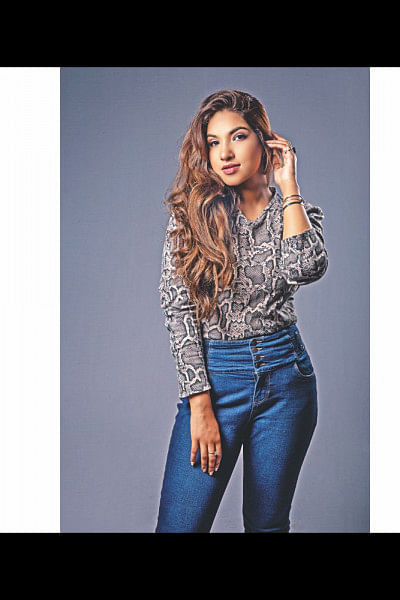Raba Khan

Raba Khan is a popular Bangladeshi social media personality, brought into fame with her ‘YouTube’ channel, ‘The Jhakanaka Project’. She’s also known as an RJ and the author of the book, ‘Bandhobi’. In this interview with Star Showbiz, she opens up about the struggles of being a female entertainer.
Is there something interesting about you that the readers are yet to know?
The internet persona that I have is extremely bubbly and fun, but in reality, I’m not quite like that. I’d say I’m more reserved. I prefer observing people over talking to them. However, I don’t want them to feel self conscious in front of me.
When did you start your ‘YouTube’ channel?
I started my channel back in 2014, just before May. I had an Ask.fm account. I used to post funny answers there, and that’s where the idea for the YouTube came from.
Why did you decide to go with the comedy genre?
I felt like that’s my forte. However, I didn’t want to be restricted to just that. I wanted to sing, start a clothing line, and create an agency. So, we named it The Jhakanaka Project, and not something only related to comedy.
Where do the ideas for your videos come from?
It depends on the kind of script I have in mind. I have followed a few trends, if I’m being honest, but most of my videos are original. The videos I put out have a few jokes that I had come up with in the past. I have them written down on my phone. You could say my entire career is on my phone. If it gets stolen or lost, my career is over (laughs).
How much time does it take to make a video?
It entirely depends on the kind of video. The script for my video, MAKEUP GUIDE FOR BOYS took me twenty minutes, and had two jokes that I came up with three years ago. So, I guess you could say it took me three years and twenty minutes (laughs).
You receive both positive and negative reviews. How do you respond to backlash?
I only care about the reviews which help me become better. I appreciate constructive criticism. Negative comments which have no basis are usually ignored by me. There are many comments mocking my nose, saying I’m intolerable, and so on. I feel that I shouldn’t put my time and effort into being more ‘tolerable’ to them.
Who are your inspirations?
I really don’t have any. My type of comedy is relatable. So, it becomes vulnerable to being labelled as copied. That’s why I don’t watch stand-up comedy, especially the subcontinental ones. If I do, I might subconsciously make similar content. However, I do really like Ellen and her personality.
Are you planning on making any sitcoms or talkshows in the near future?
I’ve had plans and plenty of offers from producers and TV channels to do a pilot. However, I don’t want to do that at this moment as I don’t want to waste a script. I’m working on a lot of things right now. One day, I might do a pilot, depending on the audiences’ demand.
Do you plan on writing more books?
I’m not sure yet. I recently received an amazing review for my book. The person said that my observational power made the book very detailed. I want other people to write similar books. I want to read about the lives of girls in Dhaka, written in a fun way. I haven’t seen much of those here.
Being a woman, and with this career, it must be difficult. What are your thoughts on it?
I do believe that Bangladesh is changing. When I first started, I only received hatred. People slowly began accepting bloggers, influencers, YouTubers. That happened in Bangladesh too, albeit much later. I feel that people are really bothered seeing a young girl who does whatever she wants, without caring about how the society sees her. I understand, but it doesn’t bother me as I’ve been doing this for a long time, and have grown quite a thick skin.
How does it feel to be a part of ‘UNICEF’ as the youth advocate?
I recently worked with the World Food Programme, and got to visit the Rohingya camps. I was also able to deliver a speech. That experience was life changing. I’ll forever cherish the memory. I got to speak with a lot of children, and they’re truly inspiring. They have such big dreams, and are so strong. As an advocate, I feel extremely privileged that my voice can be heard by so many.
Which platform do you prefer the most?
I think I’ll get to know this with the passing of time. I started out with YouTube, and the platform is great. Most of my audience is on Snapchat. I love the platform, but it still isn’t very big in this country. I like Instagram as well. I really love the radio; I’ve been working there for three years now. YouTube will always be a secondary platform for me as I upload my videos on Facebook first.
Do you have any final message for the readers?
If you want to be a creator, start now. You might think you need equipments, but you don’t. I make my videos on my phone, and don’t even edit them sometimes. However, you should know how to edit and film properly. It’s great if you know both, but it isn’t essential to create content.
Interviewed by Joana Nomrata Mazumder
Transcribed by Amina Hossain

 For all latest news, follow The Daily Star's Google News channel.
For all latest news, follow The Daily Star's Google News channel. 



Comments